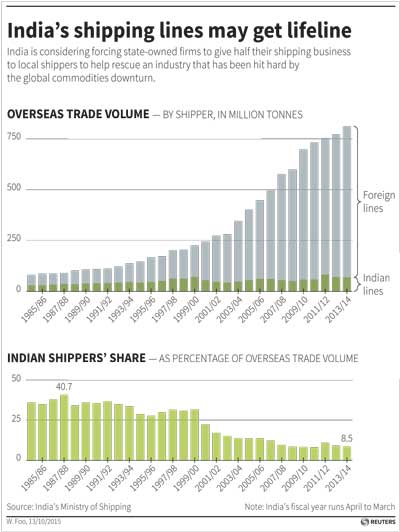Friday Feb 27, 2026
Friday Feb 27, 2026
Monday, 19 October 2015 00:00 - - {{hitsCtrl.values.hits}}

NEW DELHI/SINGAPORE (Reuters) - Indian state-owned firms may have to give half their freight business to local shippers to help rescue an industry battered by the global commodities downturn.
India’s cabinet could as early as next month consider making it mandatory for state-owned oil, steel, coal and fertilizer importers to route at least half of their cargoes through local shippers as part of a broader agenda of Prime Minister Narendra Modi to shore up and protect the ailing sector, a government source said.
New Delhi is proposing importers sign 5-year contracts with local shipping firms in a move designed to shift freight worth billions of dollars to Indian flag carriers and help boost fleet companies like Shipping Corp of India (SCI), Mercator Ltd, Great Eastern Shipping Co and Essar Shipping.
In 2013-14, India paid about $57 billion in freight payments to foreign firms.
“We have already received comments from the related ministries on this proposal ... we hope next month the cabinet will consider this proposal,” the source said, adding the 5-year contracts would help firms raise funds to expand their fleets. Shipping Minister Nitin Gadkari was not immediately available to comment.
LOSING OUT
India’s total international trade increased by more than 230% between 2000 and 2014, to 811 million tonnes last year, according to shipping ministry data, but domestic shippers saw their trade rise by just 26% as they were edged out by international firms able to offer lower rates and quicker turnaround times.
The share of Indian trade carried by domestic firms sank to below 9% last year from more than a third in 1990, prompting concern about the industry’s long-term viability.
The proposed measures are designed to reverse that decline and encourage investment and expansion.
“There is no incentive in the present shipping environment to buy vessels ... a grant of a 5-year commitment will be good for the industry and provide a comfort level to the lenders,” said A.K. Gupta, chairman of SCI, the country’s biggest ship operator.
Assured employability will encourage operators to increase Indian tonnage, and linking freight to international benchmarks “will be a ‘win-win’ for shipping companies, charterers and lenders,” he told Reuters.
“Asset prices are at their lowest and this is a good time for Indian industry to invest,” said Anil Devli, Chief Executive of the Indian National Shipowners’ Association (INSA).
KNOCK-ON BENEFITS
A key part of the new proposal is to link the freight rates charged under the contracts to global benchmarks such as Clarksons and World Scale in order to bring greater transparency to rate setting and avoid local shippers setting up cartels.
The move fits Modi’s ‘Make-in-India’ push toward creating skilled jobs for millions of young Indians.
“As more Indian ships start participating in the regular carriage of Indian imports, other ancillary industries such as bunkering, ship repair and even ship building will grow,” Devli said.
Most foreign-flag vessels calling on Indian ports bunker, or re-fuel, in Singapore or Khor Fakkan in the United Arab Emirates, and don’t hire Indian seafarers, Devli said.
“As of now, the (Indian) fleet is not enough to meet our requirements, but the shipping ministry has said companies will raise funds on the back of 5-year contracts to buy more vessels,” said a person at Indian Oil Corp, which hires about 250 vessels each year for its crude oil imports.
Major international shippers who have increased trade into India over the past decade stand to potentially lose out if the new measures are implemented.
Non-domestic shippers carrying Indian freight include Frontline Ltd, Navig8 Chemical Tankers Inc , Hyundai Merchant Marine Co Ltd, Olympic Shipping , BW LPG and Avance Gas Holding , crude buyers and shipping sources told Reuters.
“Any increase in the reservation of cargo for national fleets is a cause of concern because it reduces the volume of cargo available for free traders, such as many Greek or Hong Kong shipowners,” said Arthur Bowring, managing director of the Hong Kong Shipowners’ Association.
Yet the robust growth rates in economic activity and overall international trade should continue to make India an attractive market for most international carriers, sources in the industry said.